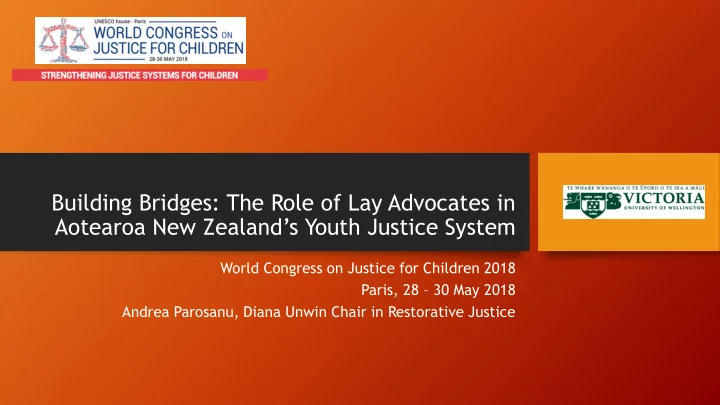

Building Bridges: The Role of Lay Advocates in Aotearoa New Zealand’s Youth Justice System World Congress on Justice for Children 2018 Paris, 28 – 30 May 2018 Andrea Parosanu, Diana Unwin Chair in Restorative Justice
Content • Overview of the youth justice system • Lay advocates - Concept and legal framework • Role in the youth court system • Relevance since establishment of Rangatahi/Pasifika Courts • Challenges and outlook
Overview of the Youth Justice System • Guiding principles • Diversion • Family participation and empowerment • Priority of community based alternatives • Family group conference (FGC) as primary decision-making tool • Restorative principles and cultural responsiveness
Overview of the Youth Justice System • Reforms in the field of youth justice • Oranga Tamariki Act 1989 • Tranformation of youth justice and care and protection systems • New operating model • Extending Youth Court jurisdiction – inclusion of 17 y.o. (by 2019)
Number and rate of children and young people charged in court, 2001-2016 6000 140 120 5000 100 4000 80 3000 60 2000 40 1000 20 0 0 2001 2002 2003 2004 2005 2006 2007 2008 2009 2010 2011 2012 2013 2014 2015 2016 Number of young people charged Rate per 10,000 young people
Lay advocates – concept & legal framework • Background • Family central to decision-making • Youth justice system – culturally responsive • Appointment of Lay Advocate (S 326 Oranga Tamariki Act 1989) • Cultural background, knowledge of the culture of young person • Principal functions (S 327 Oranga Tamariki Act 1989) • Bring cultural matters to court’s attention • Represent the interests of the young person’s family • Also: support the young person
Principal functions • Principal functions of lay advocate (S 327 Oranga Tamariki Act 1989) • (a) “to ensure that the court is made aware of all cultural matters that are relevant to the proceedings; • (b) to represent the interests of the child’s or young person’s whanau, hapu, and iwi (or their equivalents (if any) in the culture of the child or young person) to the extent that those interests are not represented in the proceedings.”
Role within Rangatahi/Pasifika Courts • Relevance since establishment of Rangatahi Courts (2008) & Pasifika Courts (2010) • How do the Rangatahi and Pasifika Youth Courts operate? • Māori/Pasifika cultural setting and processes • Support young offenders and their families, hold young offenders accountable • Youth Court monitors completion of FGC plan
1. Judge | 2. Kaumātua | 3. Whānau support person/ Rangatahi / Youth advocate| 4. Court Taker/Supervisor /Police Prosecutor| 5-6 Whānau /Lay Advocate / Service Provider| Source: Kaipuke 2012
Evaluation of Rangatahi Courts • 2009-2016 about 1,700 young people attended Rangatahi Courts, about 400 Pasifika Courts • Evaluation of Rangatahi Courts (Kaipuke 2012) • Role of lay advocates seen essential by families and professionals • Establishing a relationship ot trust and respect with families • Empowering families to actively engage with the court process • Cultural reports critical to success of the courts
Challenges and outlook • Overlap between lay advocates & social workers/youth advocates? • Clear role definition? • Lay Advocates Handbook (2014) – improved coordination and training • Increased importance in youth justice process
References • Becroft, A. (2015): The Rise and Rise of Lay Advocates in Aotearoa New Zealand. National Youth Advocates/Lay Advocates Conference, Auckland. • Cleland, A., Quince, K. (2014): Youth Justice in Aotearoa New Zealand. Law Policy and Critique. Wellington • Kaipuke (2012): Evaluation of the early Outcomes of Ngā Kooti Rangatahi. • Ministry of Justice: Annual Review 2015/16. Response to post-hearing questions. • Te Kōti Rangatahi. The Rangatahi Court. Background and Operating Protocols. 2015. • The Rangatahi Courts Newsletter. Issue 4, 2014.
Recommend
More recommend